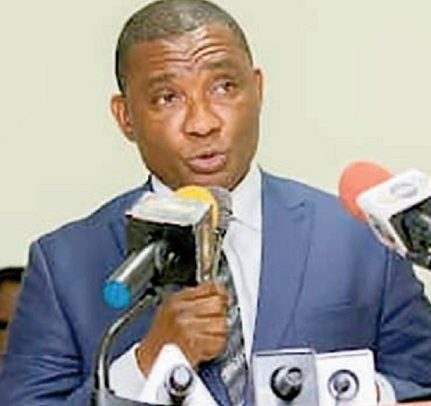Mireku Duker addressing the participants
The first phase of a pilot training workshop for District Mining Committees (DMCs) and selected small-scale miners has been opened in Tarkwa in the Western Region.
The training programme, which will be carried out in mining communities across the country, is a significant step forward in Ghana’s ongoing attempts to formalize the artisanal and small-scale mining sector.
The Ministry of Lands and Natural Resources is organising the training which is to ensure that small scale miners operate within legal frameworks, adhere to environmental standards, promote health and safety, and contribute positively to the socioeconomic development of the communities.
Mining policies and regulatory framework, geological explorations and mineralogical characterisation of ores, mining processes and operations are topics being treated at the workshop.
The remaining topics are mineral processing methods, the environment, social, health, and safety in artisanal small-scale mining (ASM), ASM business management and administration, gender mainstreaming, and child labour in ASM.
Opening the training session, Deputy Minister for Lands and Natural Resources, George Mireku Duker, praised the World Bank Group for financial and technical assistance that allowed the government to give capacity-building training.
Mr. Duker, who is also the Member of Parliament (MP) for Tarkwa, stated that responsible mining is critical to the country’s development.
“Let us work together to create an enabling environment where responsible mining practices can thrive”, he said.
“By formalizing the sector, we can mitigate the negative impacts of illegal mining activities and create a more sustainable and inclusive industry. Through building the capacity of the District Mining Committee’s (DMCs) and Ghana National Association of Small-Scale Miners (GNASSM), the government aims to ensure that sustainable and best mining practices are upheld,” he explained.
According to him, the government is doing its bit to put the mining sector on a more sustainable and environmentally friendly path, but “it is up to the Metropolitan, Municipal, and District Assemblies (MMDCEs), traditional leaders, and the GNASSM to also do their part.”
He stated that the government has resolved to guarantee that the DMCs are properly trained so that they can assist in the efficient supervision of mining operations in their respective districts.
“As you learn all the basics about mining, please get to the grassroots and do your part to protect the environment for our survival and future generations. The knowledge and skills you will acquire here will benefit you and ripple out to the broader small-scale mining community as you serve as trainers in the step-down training at the community levels,” he said to the participants.
He commended the Ghana Landscape Restoration and Small-Scale Mining Project, the Ministry of Lands and Natural Resources, and the University of Mines and Technology for developing the training manual and materials and organizing the workshop.
The Western Regional Minister, KwabenaOkyereDarko-Mensah, revealed that the region contributes about 60 percent of the country’s gold production.
He noted that mining must be done right and responsibly adding, “Let us learn the best practices to ensure its sustainability. The way the water bodies are polluted and the environment destroyed do not augur well for the industry and the country as a whole”.
He therefore encouraged the participants to abide by all the principles in mining and implement what was taught or discussed at the programme.
Assistant Basin Officer, Water Resources Commission, Isabella Ivy Kangah, stressed the need for the participants to understand the importance of the regulations, licensing and why their operations should be legalized as small-scale miners and getting the necessary permits for their operations.
She said it is very important for small scale miners to keep records and submit reports. “When you fail to submit the report, you will be fined or you can be given a penalty”, she pointed out.
From Emmanuel Opoku, Tarkwa


